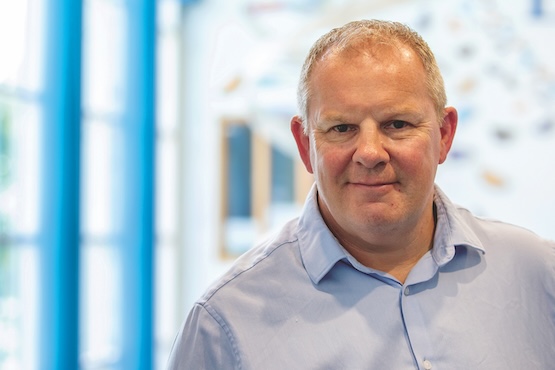Interview: Julie Ogley, President of the Association of Directors of Adult Social Services

With the social care system in “absolute crisis”, health and care leaders must work together to map a way forward, Julie Ogley tells MiP.
“We’re so caught up with Brexit that it seems impossible nationally to think about anything else,” says Julie Ogley. “Yet we’ve got an absolute crisis emerging in social care. If I can’t pay sufficient fee levels to keep an active domiciliary care market or care homes in operation, people will go into hospital and won’t be able to leave.
“Our NHS colleagues understand that locally – and I think they probably do nationally,” she adds. “But somehow we haven’t managed to get that message across to our national politicians.”
The director of social care, health and housing at Central Bedfordshire Council, Ogley has just begun a one-year term as President of the Association of Directors of Adult Social Services (ADASS), representing social care chiefs across England. And her message is clear: the perfect storm battering social care is powerful enough to drag down both health and care provision.
Focusing on complex needs
The media debate on social care tends to focus on growing demand among older people but, as Ogley points out, many elderly people can fund their own care. And rising life expectancy also increases the pressure on services for people of working age, far fewer of whom have assets: people with Down’s Syndrome, she explains, have an increased risk of contracting Alzheimer’s in their 40s, “and those are very complex and costly care packages”.
As a result, a growing proportion of social care funds are spent on people with mental and physical disabilities. “Ten years ago, the majority of my funding was around older people; now it’s equal with funding for services for people of working age,” she says. “We’re focusing on those with the most complex needs, and serving fewer people.”
“Chronic” staff shortages
Meanwhile, wage costs are rising – yet councils and care providers still struggle to recruit and retain workers – turnover among care staff averages 30% a year. The staffing problem is “absolutely chronic”, says Ogley. “We can’t recruit into our reablement service; we can’t recruit social workers.”
“People’s expectations and the money in the system don’t match,” she concludes. And while rising NHS contributions to social care have helped to keep services afloat, the government’s tendency to fill the remaining gaps via last-minute Budget allocations leaves Ogley and her colleagues unable to plan ahead. “I can’t invest those funds in anything that’s continuing – to increase fee levels in care homes, for example – because I can’t leave the council having to find that additional money the following year,” she says.
An unhelpful dialogue
There’s an urgent need, Ogley believes, for a national conversation about social care funding – but that demands a more mature, cross-party dialogue between politicians. “Language like the ‘dementia tax’ and the ‘death tax’ isn’t helpful when we’ve got a social care system that’s on its knees”, she says. “People take up positions, rather than having a dialogue about what we expect the state to provide and what families should pay for.”
In social care, she notes, people who have the money to fund their own care are expected to spend it. “There’s a part of me that wonders why we don’t have a tiered approach in the NHS, as we do in council care.”
While Ogley well understands the financial pressures on NHS bodies, she points out that the Five Year Forward View and the £20bn funding boost announced last year at least give health services some ability to plan ahead. Social care managers must, however, operate in a national policy vacuum: the long-promised green paper has now been postponed five times, while social care has been stripped out of the workforce plan. “But you need to look at the health and social care workforce together,” she says. “If we’re not careful, the NHS could see the answer to its problems as taking the care workforce. It’s already a more attractive employer because it pays more. I’m really worried that hospitals might take the nurses out of nursing homes.
“It’s frustrating that we’re not seeing the national leadership around social care in the same way that we see it around the NHS,” she comments. Government’s failure to tackle the problems with collaborative working across health and social care is, she believes, hampering frontline professionals’ ability to rebuild services for the modern world.
Struggling to integrate
In Central Bedfordshire, Ogley’s team is doing what it can. The council is planning five integrated health and care hubs and has allocated capital investment for the first. Integrated into – and part funded by – a new housing development, the hub will house five GP practices, an NHS diagnostics team, a pharmacy and community, mental health, social care and housing staff.

But such collaborative projects struggle in a complex regulatory and organisational landscape, where administrative boundaries rarely align. In Ogley’s area, a single Clinical Commissioning Group covers two councils with very different political complexions, whilst her population is served by seven hospital trusts. “The footprints in the NHS are really quite interesting, aren’t they?” she says innocently.
With NHS and social care bodies operating to very different performance metrics, incentive structures too are often misaligned. Ogley’s council is building a 168-unit ‘Extra Care’ housing development with an on-site, 24-hour care team, which she says will generate savings for the NHS via reduced rates of domestic accidents, fewer GP call-outs, and the capacity to take test samples. Council-backed projects such as ‘Village Care’ and ‘Good Neighbour’ also help relieve the burden on NHS services. But NHS financial frameworks task acute trusts with delivering treatments rather than averting them, whilst the benefits of such preventive work are hard to quantify: “When I talk to the chief executives in hospitals, they glaze over a bit, because that’s not the performance information they’re used to seeing,” says Ogley.
How can we not know each other?
To help overcome such obstacles, Central Bedfordshire has been working with primary, mental and community health providers to improve use of resources across the system – building care around patient journeys rather than individual services. “And I was staggered, because people didn’t know one another,” she comments. “How can we all be working in a local area, and not know the district nurses or the mental health team?”
This work, she adds, was nearly derailed when the Department for Health and Social Care threw its weight behind the Primary Care Home and Primary Care Network initiatives. “People wanted to stop what we were doing and start something else,” she recalls. “Sometimes, people feel that they’ve got to follow national initiatives to the letter without thinking: ‘Actually, we’re already doing this.’”
But Ogley does understand that the government’s tendency to constantly push initiatives down through the NHS can make life difficult for her health service colleagues. “Councils don’t quite appreciate the level of direction that comes through the NHS,” she says.
But equally, NHS staff often seem mystified by councils’ decision-making processes, she adds. “In public meetings with elected members, officers do not speak unless asked,” she explains. “We have lots of informal meetings with politicians where we can speak freely, but in those set pieces we have to remember our place. Sometimes people think I’m crazy when I say this is how it is.”
Longer-term perspectives
Yet Ogley argues that council decision-making often generates longer-term perspectives on the future of service delivery than those taken by NHS bodies, which must pursue the medium-term strategies passed down from Whitehall. “The council has a generation-long time horizon, whereas the health system works on a five-year plan,” she comments. “So when we’re going for approvals within the NHS, people are still thinking about the current model [of service delivery] rather than what it will be like in five, ten or 15 years.”
For example, she says, rules designed to ensure that everyone has a local GP mitigate against centralising primary care in Central Bedfordshire’s integrated health and care hubs. Yet emerging technologies and working practices would permit hubs to provide better services for patients – increasing the use of remote consultations, for example, and reducing the need for outpatient referrals.
Making the most of tech
New technologies are transforming the provision of social care, she adds, allowing more people them to live at home without a care worker on site. But, she argues, two changes are required in the way these new technologies are being developed.
First, they should make the leap from medical to consumer technology – becoming more accessible and intuitive. “I don’t think that the specialist technology people around social care are really linking with the big providers that produce iPhones and what have you,” she says. “There’s a bit of distance there, and we really ought to try and bring them together.”
Second, she argues that many new systems focus on cutting the cost of existing service delivery models, rather than supporting entirely new models. “I can book a weekend break from my sofa, but not respite care for my mum,” she comments. “We’ve just tried to procure a new customer database and financial management system with an e-market and a self-service portal, and we’ve not been able to find that. We should be! If you can do your shopping online, why can’t you look at what support is available, what it might cost, and who you might choose to provide it?”
Risks of collaboration
Likewise, Ogley says, people developing new ways of collaborative across health and social care must keep their eyes on two risks. First, integrating health and social care delivery must not lead to the separation of social care activities from other council operations: the goals of social care professionals are best realised in partnership with those managing housing, libraries, leisure centres and other services, she argues. In Central Bedfordshire, she points out, her control of both housing and social care much improves services for the borough’s ageing population – enabling her to develop the Extra Care scheme, for example, and to build apartments that tempt older people out of under-occupied family homes.
Second, she warns that councils must be given a full say in the emerging partnerships with NHS bodies. “We’ll find it really hard if we don’t include local authorities properly, coming together as equals,” she says, pointing out that councils “have different populations and challenges. And decisions made years ago about levels of council tax have an impact. There are some areas in which councils need to keep their autonomy, and council tax is the big one.”
The “current model of social care is not fit for the future,” says Ogley. And in the absence of national leadership or secure funding, she urges social care directors to seize the initiative and map out a path forward: “We’re going to have to stand in that space.”
In doing that, she knows that social care chiefs will have to work hand-in-hand with NHS leaders – overcoming the many fractures between their professional worlds, and building services that meet the needs of patients rather than organisations. “We need to bring together a system where we make decisions in the same time frame; where we consider our population as it’s going to be, as well as it is now; and where we look at all of a person’s needs – whether it’s housing, or prevention, or treatments and care,” she concludes. “And we need to find a way of doing that together.”
Related News
-

“Showing kindness and trust creates a virtuous circle – people respond well to that”
As chief executive of Suffolk and North East Essex, one of England’s most highly rated integrated care boards, Ed Garratt has pioneered a radically different approach to leadership – one based around kindness, trust and putting down deep roots in local communities. He talks to Healthcare Manager’s Matt Ross.
-

We need to give managers reasons to join the profession — not risks to avoid
Steve McManus’s work developing the leaders and managers the NHS needs for the 21st century has caught the eye of national leaders. The Royal Berkshire trust chief executive talks to Matt Ross about transforming services, developing leaders and the right way to regulate the management profession.
-

Interview: Dr Phil Hammond, doctor, comedian, health campaigner
Doctor, comedian, broadcaster, writer, health campaigner and politician manqué, Dr Phil Hammond is now drawing up a manifesto to rescue the NHS and boost the nation’s health. On the eve of a watershed general election for the UK, he spoke to Healthcare Manager’s Matt Ross.